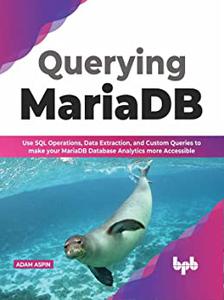Querying MariaDB Use SQL Operations
- Книги
- 12-02-2023, 09:29
- 113
- 0
- voska89

Querying MariaDB: Use SQL Operations,Data Extraction, and Custom Queries to Make your MariaDB Database Analytics more Accessible (English Edition) by Adam Aspin
English | July 25, 2022 | ISBN: 935551252X | 643 pages | PDF (Converted) | 16 Mb
Employ analytics in relational databases to advance your career
Key Features
● Use of multiple MariaDB datasets to gain hands-on experience with data analysis principles.
● Extensive examples take the reader through all levels of SQL skill, from novice to expert.
● Includes methods and techniques for doing complex database queries in MariaDB.
Description
This book will take you on an engaging experience to understand SQL querying from the most basic to the most expert level, using various SQL techniques to extract valuable insights from your MariaDB databases. The adventure will begin with the most basic level and end with the most professional level.
This book's first section provides an introduction to the fundamental concepts of both SQL and MariaDB. It then guides users through building queries using simple and then more complex table joins and progressively more powerful data filtering to generate advanced queries utilizing various SQL techniques. The reader will understand MariaDB database analysis better by learning the basics of SQL computation, relational logic, and data grouping and aggregation. Also covered are SQL basics like formatting queries, making subqueries, making derived tables, joining and filtering tables, etc. In addition, the book explains how to conduct rolling analysis, investigate time-series data, and manage enormous and complex MariaDB datasets.
When readers have finished the book, they can devise their techniques for analyzing relational MariaDB datasets and acquiring the necessary insights.
What you will learn
● Examine SQL principles such as table joins, data filtering, query design, and table derivation.
● Make it simpler to manipulate data that is dispersed across multiple tables.
● Use basic math and logic, multiple filters, and data aggregation to look at the data.
● Learn to use table expressions, subqueries, and complex calculations well.
● Utilize sophisticated techniques for rolling analysis and time series analysis.
Who this book is for
This book is for MariaDB users and data professionals, including database developers, SQL developers, data analysts, and BI specialists, who wish to design complicated queries and extract the needed insights from their datasets.
Table of Contents
1. Writing Basic SQL Queries
2. Using Multiple Tables When Querying Data
3. Using Advanced Table Joins
4. Filtering Data
5. Applying Complex Filters to Queries
6. Making Simple Calculations
7. Aggregating Output
8. Working with Dates in MariaDB
9. Formatting Text in Query Output
10. Formatting Numbers and Dates
11. Using Basic Logic to Enhance Analysis
12. Subqueries
13. Derived Tables
14. Common Table Expressions
15. Correlated Subqueries
16. Dataset Manipulation
17. Using SQL for More Advanced Calculations
18. Segmenting and Classifying Data
19. Rolling Analysis
20. Analyzing Data Over Time
21. Complex Data Output
Links are Interchangeable - No Password - Single Extraction



